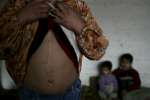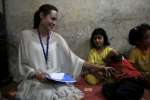Fast-talking Imam takes on new role as manager of IDP camp in Iraq
News Stories, 3 August 2015

BAGHDAD, Iraq, Aug 03 (UNHCR) – Rows of tents at Hayya alJami'a camp reflect in Sheikh Ramzy Abu Seif's oversized sunglasses. A fast-talker dressed in a long white disdasha, clutching a rugged two-way radio, Abu Seif juggled a crowd of local officials, minions and camp residents looking to lodge complaints, request a favour or just stopping by for tea and a smoke.
Abu Seif is so at ease amid the chaos that few would believe he only began managing this camp for Internally Displaced Persons (IDPs) less than three months ago. As the Imam of the local mosque he had watched for more than a year as violence in neighbouring Anbar forced civilians from their homes, hundreds of whom trickled into his neighbourhood in Baghdad's western Mansour district.
He explains Hayya alJami'a camp was only established recently.
"People were sleeping in schools, in houses, even in the gardens outdoors," Abu Seif said of one of the first influxes in early 2014, explaining that the community was largely left to fend for itself.
In total, more than 300 families have now descended on Hayya alJami'a. Most initially stayed with extended family members, but others were forced to shelter in half-finished buildings or sleep on classroom floors.
From the time the first family arrived, Abu Seif took charge of the situation.
"Everyone [who was] new who came, I took all of their information," he said pulling out a heavy ledger from behind his desk. "I had a list of every family and kept a record of who exactly was helping them, who was giving them each lunch and each dinner."
The meals were prepared and donated by neighbourhood families on a rotating basis, local doctors offered their services for free and wealthy businessmen trucked in supplies. The response was haphazard, but quick and for the most part effective.
However, as fighting in Anbar ground on without an end in sight, Abu Seif said the then emerging humanitarian crisis quickly became overwhelming. One Friday afternoon in mid-April, he made a direct appeal to the Iraqi government.
"I said to them, first we are all Iraqis," Abu Seif said raising his voice and tracing wide gestures with his hands as he recalled the speech. "We are one, there should be no difference between the leaders and the civilians. We elected you! Now, you need to serve!"
The next day government tents and supplies arrived at the doorstep of his mosque. Abu Seif laughed in amazement at how fast the response had been. Within days nearly all of the 300 families were moved into tents erected on an old football pitch.
Food is still donated locally, but its more organized now, with chicken stews and mounds of rice delivered in bulk in big plastic tubs. UNHCR has provided families in the camp with mattresses, blankets, hygiene kits and plastic jugs for storing water and fuel.
"The story of Hayya alJami'a camp is a great example of the solidarity and generosity countless Iraqis have displayed to their fellow countrymen who have been forced to flee conflict and violence", said Bruno Geddo, the UNHCR Representative in Iraq.
"But this positive attitude may change as displacement intensifies or becomes protracted, and cannot be taken for granted. By providing domestic items, UNHCR strives to complement the efforts of local communities, in order to improve the self-reliance of internally displaced Iraqis and, ultimately, ensure peaceful coexistence between the displaced and the local communities hosting them," Geddo added.
Ahmed, his wife Hiyam and their four children were one of the families sheltering in a half-finished building before the camp was opened.
"We didn't have windows or doors, we were exposed to everything," Hiyam explained from inside the tent she now shares with her family. "The second floor of the building was completely full of trash," she said, "honestly, that was the hardest part, living everyday with that smell."
In the camp, Hiyam's family shares a single tent and her husband Ahmed has already opened a small shop selling drinks and snacks. They say while their preference will always be to return to Fallujah, they are thankful they now have a more comfortable place to wait out the conflict that has engulfed their hometown.
Setting up this camp and running it day to day is a personal undertaking for the local Imam. AlJami'a camp is not just inside Abu Seif's neighborhood, it is on his street.
Just above the tents clustered in the camp's northwest corner is Abu Seif's house and along the camp's adjacent edge is his mosque.
"I can always see the camp, even when I'm at home," Abu Seif smiles, pointing up at his front balcony from between two rows of tents. "I am never far."
By Susannah George, Iraq




































